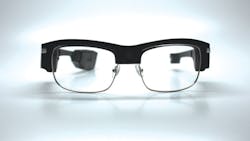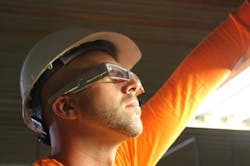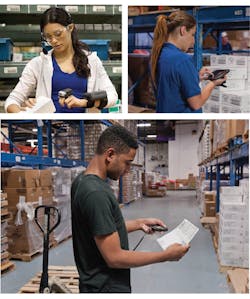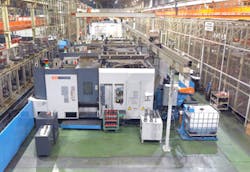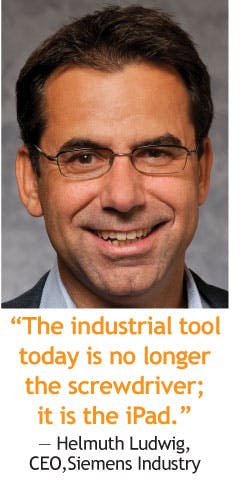The Cool Factor: The High-Tech Pull of Millennial Manufacturers
When Zack Gosney first walked into Mazak's Florence, Ky., machine tool plant back in 2011, he had no idea what he was in for.
Like most of his classmates from Scott High School in Taylor Mill, Ky., Gosney hadn't intended to find himself in a factory after graduation. He'd grown up with the images of dark, dirty and dangerous manufacturing plants his whole life and had no plans to join one once he was out of school.
"I'd never really been in a factory before," he recalls. "I thought it would be dirty and hot and sweaty. I thought when I left I'd look like I hadn't showered in three days. I didn't really know what to expect."
Gosney was into technology, into computers and electronics. He'd even enrolled in a mechatronics program at the local vocational school between fast food gigs that summer. He wasn't sure what he wanted to do, but he knew whatever it was would be modern and high tech. Electrical engineering, perhaps. But not manufacturing.
But that all changed when Mazak brought him in for that first tour.
"The minute I saw the floor," he says, "my mind was blown."
Instead of greasy machines and tired, filthy workers, Gosney found a bright, clean factory. He found high- tech tools, bright screens, lasers and gadgets and tech-savvy peers armed with exactly the kind of 21st century gear he was looking for.
He took one look, he says, and he was sold.
"I was wrong about manufacturing," he admits. "This looked exciting."
This is the central crisis in manufacturing today: Years of offshoring and reports of deteriorating conditions, along with some seriously irresponsible PR, has left the new generation of workers disenfranchised with the whole industry and less inclined than ever to join.
But that is starting to change.
Gosney is just one member of a steady march of millennials and young workers being lured back to manufacturing not by benefits or salaries, not by stability or futures or any of the motivators of previous generations, but because manufacturing has suddenly become sort of … cool.
Today's manufacturing environment is high tech; it's gadget filled; it's challenging and dynamic. Industry is -- all of a sudden -- exactly what this new generation is looking for.
It's just a matter of convincing them of it.
Silicon Valley Rust Belt
The modern factory has been hit by a tsunami of new gadgets, new tools and new interfaces that are taking over jobs along every step of the manufacturing process.
All of them -- from simple industrial-grade smartphones to smartglasses -- should seem very familiar, particularly to the younger generation.
"We're seeing a major convergence going on in the industry between consumer-grade devices and industrial grade devices both in form and function," explains Mike Wills, vice president of sales for manufacturing at Motorola Solutions.
That convergence, he says, is both a purposeful and a carefully orchestrated move by the industry to achieve one goal: to meet the high tech needs and expectations of today's 21st century workforce.
"We see a lot of new users entering the workforce that have a huge depth of IT device familiarization," he explains. "They already know how to use technology to make their lives easier, to get access to data and help them make critical decisions. They naturally expect their industrial devices to do the same thing."
Providing equipment to do that, he explains, is a critical challenge for the whole market.
"The biggest concern with this manufacturing revolution, or renaissance or whatever you want to call it, is in attracting and retaining the new workforce," he explains.
If these workers are greeted by a true 21st century environment, one designed around their inductive learning styles, employing interfaces and back-end designers they were raised with, it can transform the whole industry, he argues.
So Motorola Solutions, just like every other player in the market, has gone on an innovation binge in recent years, pushing out slick tablets and ruggedized phones along with wild, space-age wearable gadgets that do everything from barcode scanning to full-on augmented and virtual reality.
As these devices proliferate, the manufacturing environment is starting to resemble more a Silicon Valley venture than a Rust Belt industry. And that is having a powerful effect.
Not Your Grandfather's Manufacturing
"This isn't your grandfather's manufacturing," explains Helmuth Ludwig, CEO of Siemens Industry U.S. and one of the industry's loudest high-tech manufacturing advocates.
"The industrial tool today is no longer the screwdriver," he says. "It is the iPad. And that is exactly what is starting to attract the next generation."
Ludwig sees American manufacturing in the midst of a revolution. There are new jobs coming, he says, there is onshoring and reshoring happening; a new generation is entering the workforce with new expectations, new demands and new skills.
And all of it is creating "a very different world of manufacturing," he explains, one that is centered on new technology and the new capabilities that technology enables.
"The manufacturing revolution," he likes to say, "is really a software revolution." More to the point, it's a new kind of software aimed directly at tech-savvy kids like Gosney coming in. It's software and functionality that millennials have used practically since birth. Only industrialized.
"Our controls feel very familiar," Ludwig says. "We've invested heavily into usability in the last years. It's part of the generational change: People want to use their automation equipment almost like they use equipment in their private space."
To meet those demands, Siemens' platforms, just like every other industrial IT provider, have become more innovative, more drag-and-drop, more functional and graphic than ever before. In effect, they are transforming real-world manufacturing into a virtual world for the video-game generation to master. And Siemens is throwing it to every young worker it can reach to help make that happen.
Going Commercial
This change is not easy, however. For device manufacturers like Motorola Solutions, it means doing the unthinkable: going head-to-head with commercial electronics.
"We are suddenly in competition with consumer smartphones," Wills explains. "Most people understand that the smartphone is never going to replace the enterprise mobility offering and built-for-purpose ruggedized equipment, but in terms of end-user pricing and usability and form, we have to keep pace with the consumer-grade stuff."
To do so, he says, device manufacturers have begun dipping into their own consumer brands, even repurposing subcomponents from the consumer device space to keep the industrial gear up to date without skyrocketing R&D costs. Which is a pretty clever move, all things considered.
And beyond that, it comes back to Siemens' software revolution point: "It's not just hardware and technology packaging that providers like Motorola Solutions have to keep pace with, it's our application providers," Wills says. "These guys have to constantly stay abreast of new platforms as well as preferred user interface designs for systems and layout, for touchscreen interfaces, even just how to populate those screens with keyboard manifestations.
"It's a challenge for everybody participating in this to stay current with these kinds of trends," he says.
But the payoff for successfully doing so, he adds, is profound. And not just for the device makers, but for manufacturing as a whole. It is, he believes, the key to attracting that next generation.
"Is there a degree of retention around this? When customers or manufacturers in this space make these kind of future and advanced technologies, are they able to retain knowledge workers and attract more of them?" he asks. "I think the answer is a resounding yes."
Change Everything
Back in Kentucky, Mazak is actually putting it to the test. Mazak's Florence plant is currently knee-deep in a total technological overhaul. It is upgrading every machine, every interface and every system into one vast, interconnected virtual manufacturing web that is accessible, traceable and trackable from any secured smartphone anywhere in the world. It is a full-scale, make-or-break attempt to transform the plant that blew Zack Gosney's mind in 2011 into something even more mind-blowing -- something no tech-hungry young worker could possible resist.About the Author
Travis M. Hessman
Editor-in-Chief
Travis Hessman is the editor-in-chief and senior content director for IndustryWeek and New Equipment Digest. He began his career as an intern at IndustryWeek in 2001 and later served as IW's technology and innovation editor. Today, he combines his experience as an educator, a writer, and a journalist to help address some of the most significant challenges in the manufacturing industry, with a particular focus on leadership, training, and the technologies of smart manufacturing.
